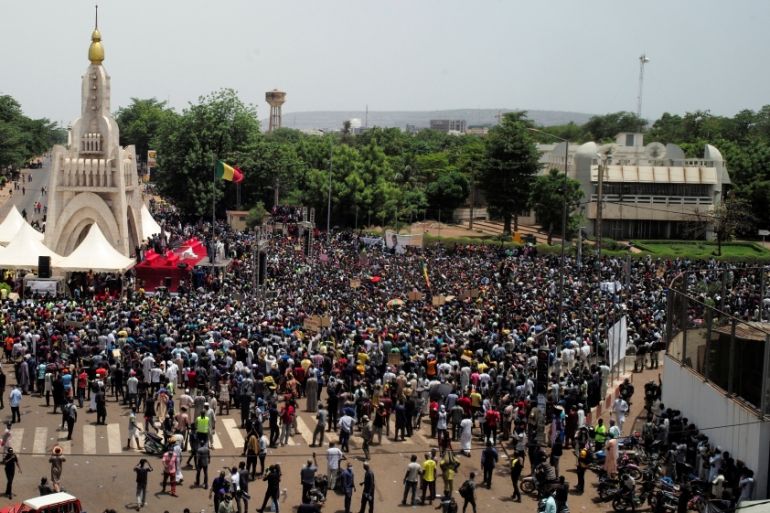Calls for calm as Mali gov’t criticised for response to protests
International and regional blocs condemn use of lethal force during demonstrations as political crisis deepens.

International and regional powers have expressed deep concern over a deepening political crisis in Mali, condemning the use of lethal force against anti-government demonstrators and appealing for restraint.
Bloody protests broke out in the capital, Bamako, on Friday and Saturday, with reports saying security forces fired live rounds during clashes with demonstrators, some of whom had occupied state buildings.
In a statement released overnight on Sunday, representatives of the United Nations, European Union, African Union and the West African bloc ECOWAS condemned “any form of violence as a means of crisis resolution”.
They denounced the use of deadly force by the security forces and urged dialogue, but warned that the arrest of protest leaders was an obstacle to this.
Several opposition figures have been detained in recent days, as the government cracked down on the June 5 Movement, an opposition alliance of political, religious and civil society tapping into grievances over a worsening security situation, economic problems and perceived government corruption.
The protest movement has put President Ibrahim Boubacar Keita under immense pressure, insisting on his resignation despite a number of concessions offered by the 75-year-old in a bid to resolve the escalating crisis.
Known as the M5-RFP, the opposition alliance has called for “civil disobedience”, including non-payment of fines and blocking entry to state buildings.
“We can really find and obtain everything we want through patience and good behaviour,” the most prominent M5-RFP leader, influential Muslim preacher Mahmoud Dicko, urged supporters on Sunday.
|
|
The government acknowledged four people were killed on Friday. The opposition says the policed killed at least eight more during smaller protests on Saturday.
A senior official at an emergency department of a major hospital in Bamako was quoted by AFP news agency as saying 11 people died and 124 were injured since Friday.
International and regional powers fear political turmoil in Mali could undermine their military campaigns against a multitude of armed groups in West Africa’s wider Sahel region.
The country of some 19 million people has been engulfed by conflict since 2012 when an uprising by Tuareg separatists erupted in the north. The rebellion was quickly overtaken by armed groups that have expanded their reach in the Sahel despite the presence of thousands of regional and international troops, including more than 13,000 peacekeeping soldiers in Mali.
As the political wrangling continues in Bamako, fighters are wreaking havoc in the centre of the country, where some 600 civilians have been killed so far this year in the unrest including armed group attacks and intercommunity violence.